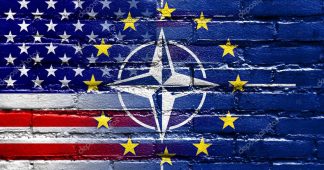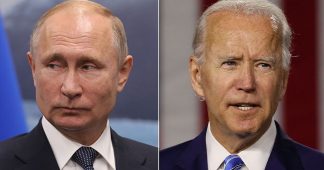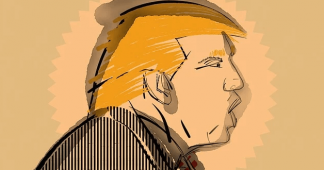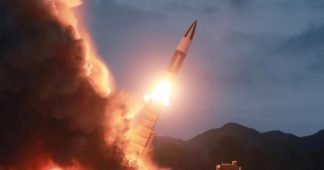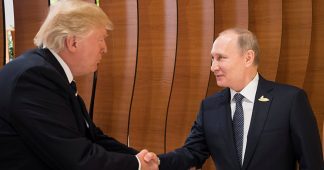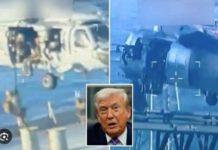By Dimitris Konstantakopoulos
Jun 9, 2021
“Ideas are late compared to the being” – Karl Marx
The forthcoming meeting of the Presidents of Russia and the United States has, objectively, a huge, we might even call it historic, significance, regardless of what results it comes to! Εven the absence of results will prove significant. There are three reasons we attribute such importance to this summit.
The first is the fact that it is taking place in the context of a very dangerous and escalating new Cold War. It is very urgent and of vital importance, not only for the powers involved, but also for all humanity to find ways to stop any further escalation and begin reversing the course of this war.
The second reason this meeting is objectively important has to do with the fact that it is taking place in the conditions of the emergence of a new, reformist leadership in the very centre of the western world. The relations which will be established between Moscow and this new leadership will greatly influence the world situation.
The third reason has to do with the fact that this meeting is taking place within the context of a very rapid deterioration of the situation regarding the enormous, existential threats of all sorts that mankind is facing in the short-and medium term. Those threats are by far the most terrible and threatening in all the 300,000-year history of humans.
But those questions still seem to occupy a secondary place in the politics of great powers, who do not seem to see the importance of the possibility of terminating life on Earth
Only by dramatically upgrading their position in the real political agenda (and not only in rhetoric) and only by a high level of co-operation between all states and, in particular, great powers, can humanity probably have any hope of surviving this century.
Why the new Cold War is more dangerous than the first one
The United States, the forces that influence, shape and “guide” their policy, and the whole “wider West” launched a new Cold War after 2014, which they had been preparing since the fall of the USSR. The new Cold War is much more dangerous than the old one. The new Cold War is dangerous for a variety of reasons. The first of them being that it is taking place in an environment of exponential development of new technologies that are constantly being introduced in the art of war, making the battlefield immeasurably more complicated and revolutionising the art of war itself. This complexity is combined with the shortening of the times during which critical decisions must be made, with the increased emotional weight of decisions and with the inevitable “bias” in the diagnosis of risks by operators acting in an environment of escalating tension and uncertainty as to the intentions of the opponent.
This brings us to a situation which begins to go beyond the possibility of the human mind, human reason and human psychology to control things in a rational way. We are tending towards a situation where AI systems, that is intelligent robots, will take decisions which can be decisive for the very survival of humans.
The Uncertainty Factor
The second reason the situation is more dangerous than during the first Cold War is that now, there are no codes or back-stage communication channels and the degree of certainty characterising the first Cold War; there is not even the fundamental political knowledge and understanding of the world that the political and state personnel of the United States and the Soviet Union possessed. This new environment of anarchy (of high entropy) is also the optimum environment for the actions of agents provocateurs, or, if you prefer, of “Agents of chaos”.
The new Cold War is being waged without any regulatory framework, like Yalta was until 1991, completely unacceptable and counterproductive in many other respects; but we should also recall the ABM treaty (prohibition of anti-ballistic weapons) after 1972, or the Helsinki Final Act (until the interventions in Yugoslavia). All those documents, encompassed in international law, the political result of the victory of European (and in particular of Soviet) peoples over Nazism, had this in common: they reflected the mutual recognition of the other side and the intention not to go to war. The ABM treaty went a step further. It translated this declared will in practical measures to make a nuclear world war impossible
The fact that the West did not respect its own promises to the Soviet leadership in exchange of accepting German reunification, in particular not to extend NATO, has dealt a devastating blow to the confidence necessary for any form of stability and arms control.
If all that was not enough, the new Cold War is combined with the increasingly frequent emergence of a plethora of international crises of all sorts, especially after 2015, which tend to make the equation of maintaining elementary stability and world peace unsolvable.
Other political conditions that might turn the Cold War into a Hot War
Another key factor that makes the current situation more dangerous is the absence of a strong anti-war, anti-nuclear, pacifist movement, the bearer of a superior human consciousness, which was a key factor that prevented nuclear war, but also limited the possibilities of colonialism and imperialism, contributing substantially to its defeats (Vietnam, Algeria).
Another key factor is the prevalence of an almost totalitarian regime in Western information, due to the historically unprecedented control by international financial capital, but also to the development of internet media with a very large capacity for manipulation, also controlled by financial capital, which has also “bought” the vast majority of “intellectuals” whose role has been decisive in the past, and to prove it– it is enough to cite here names like Jean-Paul Sartre, Albert Camus, Bertrand Russell. Today, it is very doubtful that Daniel Ellsberg would find a newspaper to publish his Pentagon Papers, and if he still published them, it is very likely that they would stop their dissemination, or drown them under a pile of internet trash.
A war impossible to win
In its escalation, this new Cold War poses the very great risk of leading humanity into a more and more difficult to control (even for technical reasons) arms competition and, ultimately, to a great probability of confrontation by miscalculation, by mistake, or by the emergence of organised madness (irrationalism). The messianic ideas of people like Israeli Zionists or Evangelicals (Christian Zionists) are a good example. It is true that for the time being they were checked by logic and survival instincts, but we cannot be certain that this will always happen, especially in a protracted environment of continuous conflicts, escalating confrontations and crises without solutions
We know after 1945, that it is impossible to win a World War. We know that such a war will lead most probably to the extinction of the human species and that the luckiest humans will be those who will die immediately. No rational and informed human being today can believe a victory in a nuclear war is possible. Nuclear weapons and the threat of their use are unfortunately still needed; they are the MAD counterbalance to a mad world, but they are needed in order to preserve equilibrium preventing the war, not to make possible an unattainable victory.
The power of ideas
At the same time, of course, there must be a global movement calling for their abolition worldwide, in a balanced way, in order to mobilise and focus the global consciousness of this ultimate danger.
This is very important because the war still remains the continuation of politics (Clausewitz). That means that ideas do play a role as important as weapons in terms of who is going to win a war but also whether or not such a war is possible. Important forces in the US and British establishment wanted a new WW against the USSR even before the end of WWII. They did not launch it, even in conditions of US atomic monopoly, because their public opinion was not disposed to follow them
The Red Army, the predecessor of the present day Russian Armed Forces learned those realities the hard way during the Russian Civil War. When it tried to face the Whites in Kuban, the land of hostile Cossacks, it failed miserably, putting Moscow itself in danger. However, it crushed the Whites when it changed the location of the front and gave the decisive battle in red, workers’ Donetsk. It is not a mere coincidence that this city has been found now, again, in the epicenter of the East – West confrontation in Europe.
The United States Armed Forces learned the same truths and in an equally hard way in Vietnam and, more recently, in Afghanistan and Fallujah of Iraq (where they operated along with British, always keen to participate directly in the most dirty operations worldwide). One of the reasons the US won the Cold War was their policy of attributing great attention to the way people were thinking or feeling, or, to be more precise, to the impressions their policy was creating.
When they came to believe they had assured “eternal” victory (the “End of History”), they began to behave without bothering even for the pretexts. This is one of the main reasons they lost what seemed an unprecedented omnipotence back in 1991, in a very short time – span (judging by measures of History).
The importance of ideas, of what people are thinking, is even greater now, because the problem is not to win a world war, but to avert it. In 1939, we had the “luxury” to be able to fight against Nazism and win over it with an enormous cost. Now we do not even have this “luxury”.
Mr. Biden told George Stephanopoulos that he signed the START Treaty his predecessor wanted to abolish because it was for the good of humanity that is above everything else. But, if he means what he says, he must take urgent measures to stop the continuous demonization of Russia and, now, more and more, of China by the western political establishment, by NATO and, in particular by the western media system. The way the West is now portraying Russia and China is the same it was portraying Iraq, or Libya, or Greece before attacking them.
And even if this is not the real intention, it will be understood as such by military and political planners in Russia and in China, who will act accordingly. In reality, this has already happened. It is very difficult for Biden to reverse this course, and we have noticed how big televisions and newspapers in the USA are pressing continuously both Biden and Blinken to become more hawkish, but there is no other way. If Biden succumbs to such pressure, if he does not take bold initiatives to reverse course, he will be unable to fulfill any of his promises to his voters and we will go to bigger and bigger tragedies worldwide.
In the less dangerous conditions of the first Cold War, humanity has already come very close to the possibility of its destruction. Now the situation is more dangerous, so it is necessary to take measures to stop the escalation of the Cold War and reverse this course. The same must be done in the relations of the US with China and Iran, and also in the “Bermuda Triangle” of South and East Asia.
This is not enough, because the weapons are, after all, the symptoms, not the root causes of the confrontations. But it is still necessary to dispose of them and, if done in a way respecting strategic stability, it may also help to address the root problems.
Biden’s victory and Netanyahu’s defeat
The second reason making the upcoming summit very important is the appearance of the Biden group in the leadership of the US, as well as the looming departure of Netanyahu, who is not just an Israeli politician, but a prominent leader of the world party of the “war of (on) civilisations”, whose project is the descent of mankind into a situation of chaos, of war of everybody against everybody.
We are currently witnessing, in the very centre of the Western system, the emergence of forces that mark a first break, after several decades, with the dominant neoliberal model (the twin brother of neo-conservatism), but also a first and still uncertain recognition of the idea of a “multipolar world” (acknowledged by Brzezinski in his last book as it was by Richard Haas, the secretary of the CFR, in a recent article). We are also witnessing the re-emergence of the notion of “strategic stability” (by Biden himself), a notion the US had already begun to abandon in the 1990s, with the Jeremiah and Wolfovitch reports on their post-cold war strategy, the wars in Yugoslavia and the Middle East, the expansion of NATO and the abolition of all arms control treaties, except for START (concerning strategic nuclear arms), which was saved by Biden himself at the last minute
The crisis has always produced two camps at the very centre of the Western capitalist and imperialist system whose real centre of power has shifted, more and more clearly, after 1991, to the global “empire” of finance and its exponentially increasing influence in all states, including the US. It cannot be considered any more a mere economic force: it is a strategic, and probably the most powerful strategic, vector, with considerable influence in many states, including the US.
From Roosevelt to Kennedy
The crisis and dilemmas before which the “system” was set produced Roosevelt of the New Deal on the one hand, and Donovan, Foster Dulles, Truman, and Hoover on the other. Stalin believed that Roosevelt did not die a natural death, but because he was an obstacle to the Third World War (and the “dictatorship” in America itself), although there is no proof of such a claim.
The same dilemma produced Eisenhower (elected on a hawkish agenda) on the one hand, and his generals on the other, who wanted to drop nuclear bombs on Korea and China. Eisenhower also turned against Israel, the most revisionist state in the world since World War II, and its allies Britain and France, when they intervened in the Suez Canal in 1956. He threatened them with military intervention and launched an attack on the British pound to stop them, while it is widely believed that the Soviet leader Nikita Khrushchev also threatened the use of Soviet nuclear weapons for the same reason.
The same dilemma produced, on the one hand, the Kennedy brothers, who prevented the unleashing of global nuclear war (and probably paid for that with their heads as well) and, on the other, Kennedy’s vice president and subsequent President Lyndon Johnson, who escalated the war in Vietnam.
Such conflicts always occur and it is inevitable that such conflicts will occur within capitalism and imperialism when faced with crises. Sometimes former hawks become doves, like President Kennedy, who ordered the Bay of Pigs invasion but, after the Cuban missile crisis, wanted to revise all US policy towards the USSR. As James Galbraith told me one day, John Kennedy asked his father, one of the greatest Keynesian economists of the 20th century, John Kenneth Galbraith, to become the US ambassador to Moscow. But of course, Kennedy was then assassinated.
Is this a “window of opportunity”?
The same phenomenon is being repeated today. We cannot estimate with certainty how real this “window of opportunity” is, what results it will bring and how long it will last, and it makes little sense to attempt a definite answer and prediction. The only way to find if it exists and where it can lead is provided by the Russian proverb “trust but verify” (Доверяй, но проверяй), adopted by President Reagan as the central line of his negotiators with the then USSR.
This is all the more important for another reason. If the forces that Biden represents are defeated, then the way will be opened for the return of the opposing forces, of the War of Civilizations and Chaos scenario and, as a result, the danger of humanity’s descent into irreversible chaos will increase enormously.
Some of my friends believe that the West is finished. A French friend of mine recently compared the USA to Chernenko and another to Gorbachev’s USSR. I am afraid this is wishful but dangerous thinking. The US and the West at large still hold enormous power. Maybe it is not sufficient to perpetuate their global domination (this is an open question, because it depends not only on objective, but also on subjective factors). In any case they still possess the means to destroy everybody.
In this connexion, if you look at the destruction of the USSR from the point of view of the global system, it led to a huge increase of its total entropy. If it did not lead to an uncontrollable explosion, it was only for one reason: the Soviet nomenclatura finally adopted the general rules of the existing Western system, which was of course destructive for its own country, but still provided protection from Chaos. We consider it quite probable that at that point the United States did not push harder for the overthrow of the Chinese communist regime, in spite of the quite favourable conditions for doing so in 1989-91, exactly out of fear of provoking world chaos.
There is no doubt that the US system is a deeply imperialist structure which provoked and is doomed to provoke havoc in all the world. But its “destruction” as such will be positive only if it is replaced by a better, not a worse structure or an anarchic decent into a chaotic situation, for Americans themselves and for all the world.
All that being said, we do not, of course, mean that the forces, within the United States and globally, that are opposed to the organically linked neoliberalism and neoconservatism should offer uncritical support for what Biden is doing; on the contrary, such a policy of uncritical support would be disastrous.
To the extent, for example, that there is a Left in the United States, it must support every positive step, criticising Biden harshly when necessary, but in a way that pushes him in the right direction and at the same time exerts strong pressure to complete any progressive steps he makes, steps which can only be half-measures, by the very nature of the Biden administration and the forces it represents.
The “Neanderthal Games”
The third reason that makes the Biden-Putin summit very important is that it is taking place while the coronavirus pandemic has come to provide us with a mild example of the coming crises and of the unprecedented existential threats humanity is facing. After 1945, Mankind entered, not only with nuclear weapons, but with all sorts of technologies and by the sheer magnitude of its productive forces, a completely new era of human history. It will adapt to this era and will successfully respond to the challenges, or it will die.
This is a scientific datum, an algebraic equation that begins to become arithmetic, not some insight or prophecy. But the impression given by the political leaders of the planet is that they have not really incorporated this datum in a position corresponding to its significance in their political strategies. We call ourselves Homo Sapiens, but we are in reality less Sapiens than Homo Neanderthal, because intelligence is not an abstract quality, it is measured in comparison with the external environment. Homo Neanderthal was adapted to the challenges he was facing, while we are not. We are still hostage, to a very large degree, of our reptilian and paleomammalian brains, not of our Cortex.
Unfortunately, the only real, coherent, global plan that exists at the moment is the ‘War of Civilizations’ scenario, which inevitably leads to the destruction of civilisation and, subsequently and in parallel, to the destruction of humanity. Its opponents present various resistances, sometimes great and admirable, but they are all partial and fragmentary. The objective situation humanity is facing requires that very quickly, “holistic” measures be taken that involve a complete overhaul, in a rather short time, of the political, economic, cultural and international structures with which humanity continues to operate (holistic, because one cannot try to deal with only one problem at a time). Some will say that such a thing is absolutely unattainable, unrealistic and completely Utopian. All available scientific data we possess, not any kind of prophecy, intuition, religious or ideological predisposition, point to the inescapable conclusion that a new Utopia is the only realistic solution for humanity’s survival.
And, even if one insists on thinking in terms of competition, it is certain that the states, the leaders, the politicians and the forces that will be the protagonists in this quest, of which we do not underestimate the enormous difficulties, will certainly gain a very great competitive advantage worldwide.
Published at uwidata.com
